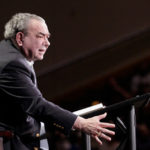 Article by R.C. Sproul (original source here)
Article by R.C. Sproul (original source here)
Paul gives great attention to ecclesiology, the doctrine of the church, in his letter to the Ephesians. In fact, we could say Ephesians answers this question: What is the church? In Ephesians 2:19–22, the chief metaphor Paul uses is that of a building—the household of God. Christians are part of the household in the sense that they have been adopted into the family of God, which is another image that Scripture uses to describe the church. But here the accent is not so much on the family of the household as it is on the house of the household: “[We] are fellow citizens with the saints and members of the household of God, built on the foundation of the apostles and prophets” (vv. 19–20a).
Paul says the foundation of this building called the church is made up of the prophets and the Apostles, that is, the Old Testament prophets and New Testament Apostles. Why? It’s because the prophets and Apostles are the agents of revelation by whom God speaks to His people. They delivered the Word of God. Another way of saying this is that the foundation of the church is the Word of God.
That’s why we must pay close attention to our doctrine of Scripture. The attacks launched against the integrity, authority, sufficiency, and trustworthiness of Scripture are attacks not upon a side alcove of this building. They don’t put a dent in the roof of the church. They’re attacks on the church’s very foundation. To have a church without Apostolic authority, without the Word of God as its foundation, is to build a church on sand rather than on rock. The foundation of the prophets and the Apostles is necessary for the entire edifice of the church to stand securely.
Paul continues the building metaphor in 2:20b: “Christ Jesus Himself being the cornerstone.” Christ is the cornerstone, the point that holds the foundation together. Take out the cornerstone, and everything falls apart. “In [Christ] the whole structure, being joined together, grows into a holy temple in the Lord. In him you also are being built together into a dwelling place for God by the Spirit” (vv. 21–22). The church is a new temple built in Christ, by Christ, and for Christ.
Obviously, Paul isn’t saying the church is a building made out of mortar and brick, but that we are the stones, the living stones, as 1 Peter 2:5 tells us. Each believer is part of this church just as each stone is part of a building. The church, the new temple, is still under construction. Every day, new stones are added. This new temple will not be finished until Jesus returns to consummate His kingdom. Christ is still building His church, not by adding cement but by adding people who are the stones that hold together in Him.
Paul continues in Ephesians 3:14–19,
For this reason I bow my knees before the Father, from whom every family in heaven and on earth is named, that according to the riches of his glory he may grant you to be strengthened with power through his Spirit in your inner being, so that Christ may dwell in your hearts through faith—that you, being rooted and grounded in love, may have strength to comprehend with all the saints what is the breadth and length and height and depth, and to know the love of Christ that surpasses knowledge, that you may be filled with all the fullness of God.
The Apostle Paul explains the doctrine of the church so that we might understand what God has done and so that we may understand who we are. And in calling us to understand who we are and what we’re called to do, Paul says that we’re the church. We’re the church that God ordained from the foundation of the world. We’re His people; we’re His household, so let the church be the church.
We’re living in a time of crisis. Many Christians are decrying the decadence of American culture and complaining about the government and its value system. I understand that, but if we want to be concerned for our nation and culture, our priority must be the renewal of the church. We are the light of the world.
Government merely reflects and echoes the customs embraced by the people in a given generation. In a real sense, our government is exactly what we want it to be, or it wouldn’t be there. Change in culture doesn’t always come from the top down. It often comes from the bottom up. The change we need to work for, chiefly, is renewal within the church.
As the church becomes the fellowship of citizens of heaven who manifest what it means to be the household of Christ, and when the church walks according to the power of the Holy Spirit—then the people of God will shine as the light of the world. When people see that light, they will give glory to God (Matt. 5:16).
This will change the world. But Paul says, first of all, let the church be the church. We must remember who we are, who the foundation is, who the cornerstone is, who the head of our building is, who the Lord of the church is.
Do we love the church? I doubt if there have been many times in our history when there has been as much anger, hostility, disappointment, and disillusionment with the institutional church as there is today. It’s hard not to be critical of the church because in many ways the church has failed us. But if the church has failed, that means we have failed. We are called to serve the church in the power of God the Holy Spirit.
We, the church, have been made for this task by the indwelling presence and power of God’s Spirit. Yet, we are called not so much to rise up but to bow down. And if we bow down to our Lord, as Paul says in Ephesians 3:14, the church will be the church, and our light will pierce the darkness.


 Article by R.C. Sproul (original source
Article by R.C. Sproul (original source